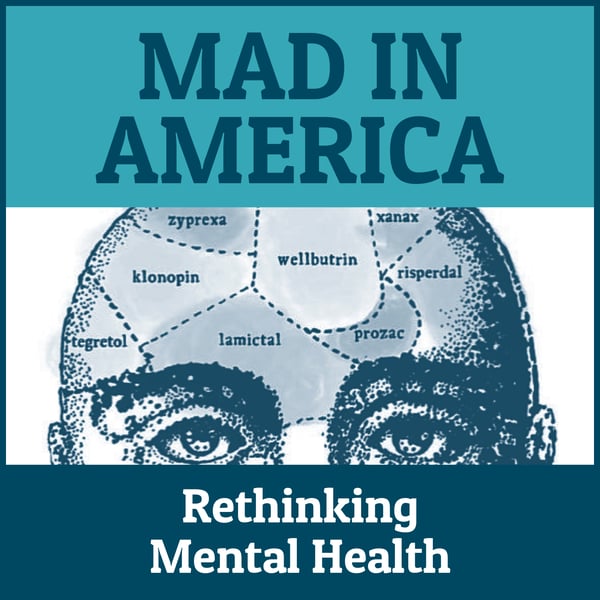The Psychological Humanities Manifesto: An Interview with Mark Freeman
Mad in America: Rethinking Mental Health
Mad in America
4.8 • 201 Ratings
🗓️ 17 January 2024
⏱️ 47 minutes
🧾️ Download transcript
Summary
Mark Freeman is a renowned author and a pioneering voice in the emerging field of the psychological humanities. He serves as Distinguished Professor of Ethics and Society in the Department of Psychology at the College of the Holy Cross. His body of work, including the critically acclaimed Toward the Psychological Humanities: A Modest Manifesto for the Future of Psychology (Routledge, 2023), offers a profound reimagining of psychology, interweaving it with the arts and humanities to better understand the human condition.
He is the author of numerous additional works, virtually all of which, in one way or another, speak to the emerging field of the psychological humanities. These include Rewriting the Self: History, Memory, Narrative (Routledge, 1993); Finding the Muse: A Sociopsychological Inquiry into the Conditions of Artistic Creativity (Cambridge, 1994); Hindsight: The Promise and Peril of Looking Backward (Oxford, 2010); The Priority of the Other: Thinking and Living Beyond the Self (Oxford, 2014); and Do I Look at You with Love? Reimagining the Story of Dementia (Brill | Sense). Along with David Goodman, he has also co-edited Psychology and the Other (Oxford, 2015) and, with Hanna Meretoja, has co-edited the recently published The Use and Abuse of Stories: New Directions in Narrative Hermeneutics (Oxford, 2023). He also serves as Editor for the Oxford University Press series “Explorations in Narrative Psychology.”
In this interview, we'll explore his personal journey toward the psychological humanities, delve into his work in narrative psychology, and discuss his approach to the concepts of 'self' and the 'Other.' We'll also touch upon how his perspectives guided him as he navigated his mother's journey through dementia, a deeply personal narrative shared in his book.
***
Thank you for being with us to listen to the podcast and read our articles this year. MIA is funded entirely by reader donations. If you value MIA, please help us continue to survive and grow. To find the Mad in America podcast on your preferred podcast player, click here
Transcript
Click on a timestamp to play from that location
| 0:00.0 | Welcome to the Madden America podcast, your source for science, psychiatry, and social justice. |
| 0:15.2 | Welcome to the Madden America podcast. This is Justin Carter, the longtime editor of the Research News section of Mad America, |
| 0:22.5 | and I'll be your host for today's episode. Today, we're honored to host Mark Freeman, |
| 0:27.2 | distinguished professor of ethics and society in the Department of Psychology at the College of the |
| 0:31.6 | Holy Cross in Massachusetts. Freeman is a renowned author and a pioneering voice in the emerging field of the psychological |
| 0:38.6 | humanities. His body of work, most recently the critically acclaimed toward the psychological |
| 0:44.2 | humanities, offers a profound reimagining of psychology, interweaving it with the arts and |
| 0:49.6 | humanities to better understand the human condition. In this interview today, we'll explore Dr. Freeman's |
| 0:55.2 | personal journey toward the psychological humanities, delve into his work in narrative psychology, |
| 1:00.3 | and discuss his approach to the concepts of self and other. We'll also touch upon how his |
| 1:05.7 | perspectives guided him as he navigated his mother's journey through dementia, a deeply personal |
| 1:10.7 | narrative he outlines |
| 1:11.7 | in one of his books. So Dr. Freeman, thank you so much for joining us on the podcast today. |
| 1:16.7 | Pleasure to be here, Justin. Thank you. |
| 1:19.2 | Could you start by letting our listeners know a little bit about who you are and what inspired you |
| 1:24.4 | in your journey toward this version of psychology and the psychological |
| 1:28.9 | humanities, how this path shaped your career? |
| 1:32.1 | In some ways, it's hard to know exactly where to begin. |
| 1:36.0 | I mean, I could go back as far as junior high and high school when I was a singer in a rock and roll band. But I'll probably leap ahead |
| 1:47.0 | instead to being an undergraduate at Binghamton University. That was in the 1970s. |
| 1:56.7 | Like a lot of people who pursue psychology, I was interested in, I was interested in big ideas, deep issues, you know, plumbing the depths of the human condition. |
| 2:06.6 | And that really wasn't what was happening at that point. I mean, on some level, it's still not happening. But back then, things were predominantly behavioral in orientation. |
... |
Please login to see the full transcript.
Disclaimer: The podcast and artwork embedded on this page are from Mad in America, and are the property of its owner and not affiliated with or endorsed by Tapesearch.
Generated transcripts are the property of Mad in America and are distributed freely under the Fair Use doctrine. Transcripts generated by Tapesearch are not guaranteed to be accurate.
Copyright © Tapesearch 2025.

